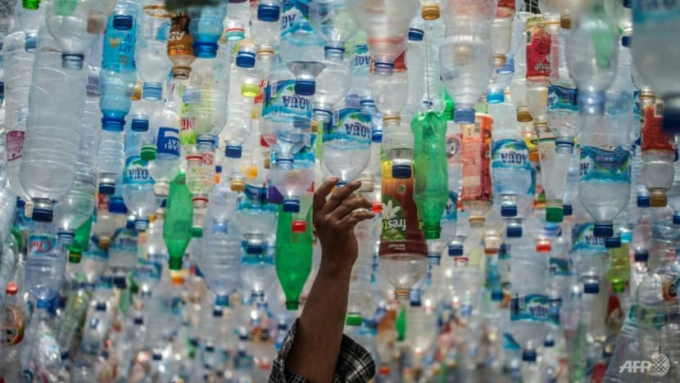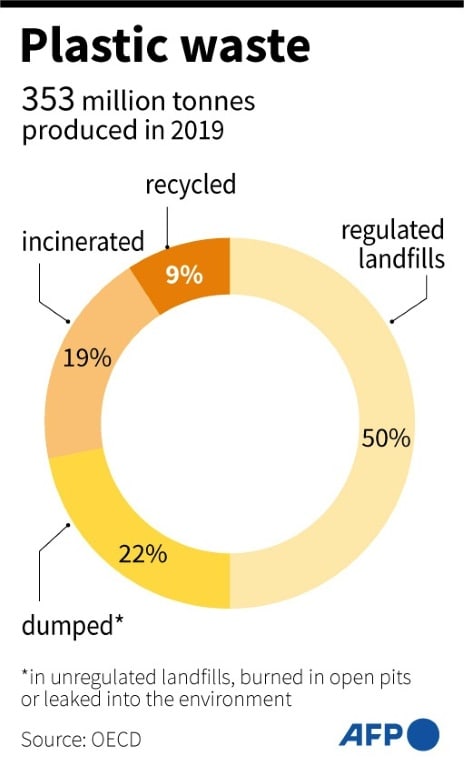November 26, 2025 | 16:30 GMT +7
November 26, 2025 | 16:30 GMT +7
Hotline: 0913.378.918
November 26, 2025 | 16:30 GMT +7
Hotline: 0913.378.918

Plastics contributed 3.4 per cent of global greenhouse emissions in 2019, the report said. Photo: AFP
A new report by the Organisation for Economic Co-operation and Development report found that 460 million tonnes of plastics were used last year, the number nearly doubling since 2000.
The amount of plastic waste had more than doubled during that time to 353 million tonnes, the Paris-based OECD said.
"After taking into account losses during recycling, only nine percent of plastic waste was ultimately recycled, while 19 per cent was incinerated and almost 50 per cent went to sanitary landfills," it said in its Global Plastics Outlook.
"The remaining 22 per cent was disposed of in uncontrolled dumpsites, burned in open pits or leaked into the environment."
The COVID-19 pandemic saw the use of plastics drop by 2.2 per cent in 2020 compared to the previous year. However single-use plastics rose and overall use is "projected to pick up again" as the economy rebounds.
Plastics contributed 3.4 per cent of global greenhouse emissions in 2019, 90 per cent of it from "production and conversion from fossil fuels", the report said.
In the face of rampant global warming and pollution, "it will also be crucial that countries respond to the challenge with coordinated and global solutions", OECD Secretary-General Mathias Cormann said in the report.
The OECD proposed a series of "levers" to address the issue, including developing the market for recycled plastics, which only represent 6 per cent of the total - largely because they are more expensive.
It added that new technologies related to decreasing the environmental footprint of plastics was only 1.2 per cent of all innovation concerning the product.
While calling for "a more circular plastics lifecycle", the OECD said that policies must also restrain overall consumption.
It also called for "major investments in basic waste management infrastructure", including €25 billion (US$28 billion) a year to go towards efforts in low and middle-income countries.
PLASTIC TREATY TALKS
The report comes less than a week before the UN Environment Assembly begins on Feb 28 in Nairobi, where formal talks are expected to begin on a future international plastics treaty, the scope of which will be discussed.

Shardul Agrawala, the head of the OECD's environment and economy integration division, said Tuesday's report "further accentuates the need for countries to come together to start looking towards a global agreement to address this very important problem".
Asked about the priorities of the treaty to be discussed in Nairobi, she said that "there is an urgent waste management problem which is responsible for the bulk of the leakage to the environment".
"But we should not limit our focus just to the end of pipe solutions, there is a greater need in the long term to forge international cooperation and agreement towards alignment of standards," she told an online press briefing on Monday.
In a survey published on Tuesday by polling firm Ipsos for the World Wildlife Fund, 88 per cent of respondents stressed the importance of an international treaty to combat plastic pollution.
In the 28 countries surveyed, 23 per cent of the respondents said such a treaty was "fairly important", 31 per cent said it was "very important" and 34 per cent found it "essential".
(AFP)

(VAN) A new study reveals how the simultaneous effects of ocean acidification, salinity and loss of oxygen are making the world more fragile.

(VAN) Hopes are growing that the creation of the first 3D turkey gut model could be a turning point in the battle against the virulent blackhead disease.

(VAN) Tyson, America’s biggest meat supplier, plans to shutter one of its largest beef processing plants as the industry continues to struggle with low cattle supplies and political pressure from Washington.

(VAN) New FAO study shows how digital solutions are empowering farmers and fishers to prevent losses and build resilient agrifood systems.

(VAN) Brazil's COP30 presidency pushed through a compromise climate deal on Saturday that would boost finance for poor nations coping with global warming but that omitted any mention of the fossil fuels driving it.

(VAN) Poultry farmers in the UK have been warned that they could face one of the worst winters yet for bird flu.

(VAN) Prices of main-crop paddy have risen sharply, with jasmine rice hitting 16,100 baht per tonne — the highest level in years.